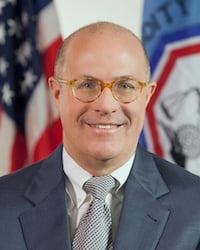The Dutch state treasury has voluntary decided to centrally clear euro interest rate swaps in Frankfurt as the European Union has proposed that systematically important clearing houses that clear euro derivatives have to be located in the trading bloc after the departure of the UK.
The Dutch State Treasury Agency said in statement that it will clear euro-denominated interest rate swaps through Deutsche Börse’s Eurex Clearing in Frankfurt at the end of the year at the earliest, even though it is exempt from the regulatory obligation for central clearing. The benefits of central clearing include lower capital requirements, counterparty risk and greater risk management.
https://twitter.com/EurexGroup/status/993836883133325312
Eurex Clearing and the state of the Netherlands entered into a clearing agreement on 8 May.
Erik Müller, chief executive of Eurex Clearing, said in a statement: “The Dutch State Treasury Agency is a very important new clearing member for us. We continue to expand our services for the over-the-counter markets to best support the needs of the financial industry, policy makers and regulators.”
Eurex Clearing said there has been a very significant increase in clearing volumes, as part of its partnership program, since the start of this year and the notional outstanding reached more than €5 trillion euros last month.
“On-boarding the Dutch State Treasury Agency will further increase the liquidity of Eurex Clearing’s interest rate swap clearing services and makes its offering even more attractive,” added Eurex.
Deutsche Börse said in its results for the first quarter of this year that the clearing volume of over-the-counter interest rate swaps has developed very well, and was boosted by the Eurex partnership programme launched in October last year.
“This programme is designed to create a liquid, EU-27-based alternative for the clearing of interest rate swaps,” added Deutsche Börse. “Since its launch the programme has received broad market acceptance, with participants joining from the US, the United Kingdom, Asia and Continental Europe.”
The European Union has proposed that systematically important clearing houses that clear euro derivatives have to be located in the trading bloc after the UK leaves the European Union.
The Brexit unit of The Institute of Economic Affairs said in a report in February that three quarters of euro clearing takes place in London. Economist Dr Gerard Lyons said in the report: “London is where the liquidity is, where multiple global currencies are cleared and where banks can make effective use of their capital. In Paris, or Frankfurt, liquidity would be lower and bid-ask spreads subsequently higher.”
Christopher Giancarlo, chairman of the US Commodity Futures Trading Commission, has previously expressed concern over the EU’s proposal to change the regulation and supervision of CCPs from outside the trading bloc. He said in a speech yesterday at the Association of German Banks in Berlin yesterday that there needs to be greater harmonization of cross-border regulation.
 Christopher Giancarlo, CFTC
Christopher Giancarlo, CFTC
Giancarlo said: “My concern lies with parts of the EU proposal that would subject U.S. CCPs to overlapping EU regulation and supervision without due deference to CFTC regulation and supervision – due deference that was already agreed to between the EU and the United States in the 2016 common approach for transatlantic CCPs. We spent three years working on that agreement and remain committed to it. We do not want to renegotiate it.”
In 2016 the CFTC and the EU reached an agreement to allow market participants to use CCPs in both the US and Europe on a level playing field. The two parties harmonized their clearing requirements and agreed to work together to oversee CCP compliance with a more uniform set of rules.
The agreement was reached before 2016 deadline for phasing in mandatory derivatives clearing in the EU so that European banks using US clearing houses, and vice versa, did not face a significant increase in capital requirements for transactions.
In addition, Giancarlo highlighted that Andreas Dombret, board member of the German central bank and and others, have said there is no need to alter this arrangement.
“The CFTC’s requirements for CCPs, like the EU’s, are based on agreed upon international principles,” Giancarlo added. “Additional regulation is unnecessary and adds to confusion and cost. The arrangement is working now. I hope this issue does not divide the United States and Europe.”
Amir Khwaja, chief executive of derivatives analytics provider Clarus Financial Technology, said in his monthly swaps data review for Risk Magazine in February that London Stock Exchange Group's clearing house, LCH, dominated interest rate swap clearing in each of the major currencies last year.
Khwaja continued that the dominance of LCH SwapClear is understandable as it was the first CCP to offer interest rate swap clearing, in 1999, and there are significant netting and cost efficiencies for members and clients in having all currencies in one clearing service.
However, he added that last year Japan Securities Clearing Corporation had greater yen swap clearing volume than LCH for the first time, so regional clearing houses are able to gain share in their domestic currency. As a result he forecast that Spain’s BME and Eurex will gain business ahead of Brexit in March next year.
“Whether this reduces SwapClear’s share in euro swaps to 90% or 50% - and in what timeframe – is impossible to predict,” Khwaja added. “The best we can do is observe month-on-month data and project trends. Last year’s data doesn’t suggest an impending sea-change, but 2018 is a key year in this regard.”














